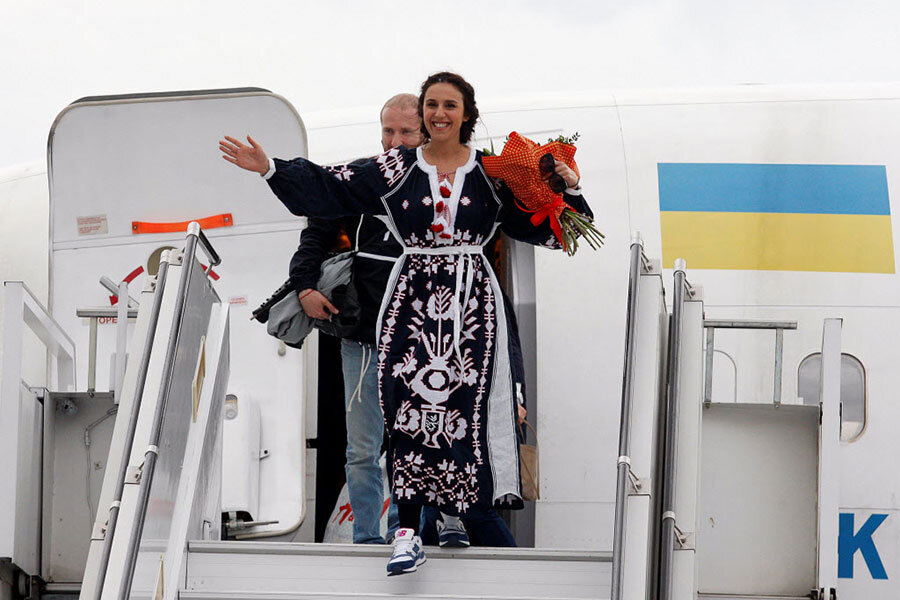Eurovision win by Crimean singer stings Russian pride
Loading...
Crimean Tatars on Sunday celebrated Ukrainian singer Jamala's win at Eurovision with a song that sheds light on their horrific deportations to Central Asia under Soviet dictator Josef Stalin but also hints at their recent treatment under Russian President Vladimir Putin.
Many Russians, whose Eurovision Song Contest entry won the popular vote but finished third when the national juries' votes were added, said they felt robbed of the win because of political bias.
The Foreign Ministry spokeswoman joked sarcastically that to win next year's contest a song will need to denounce "bloody" Syrian President Bashar Assad, who is supported by Moscow but blamed in the West for Syria's 5-year civil war.
Russia's annexation of Crimea in 2014 was condemned by the United States and European Union, which responded by imposing punishing sanctions. Inside Crimea, the seizure of territory from Ukraine was most strongly opposed by the Tatar minority, who now face persecution on the Moscow-ruled Black Sea peninsula.
"This song is about our tragedy ... and I hope that people heard this," said Emine Ziyatdinova, a 27-year-old Crimean Tatar who was among those celebrating the win at a Tatar restaurant in Kiev.
Jamala's song, "1944," recalls how Crimean Tatars, including her great-grandmother, were deported during World War II.
In the space of three days in May 1944, all 200,000 Tatars, who then made up a third of Crimea's population, were put on trains and shipped off to Central Asia upon Stalin's orders, suspected of collaborating with the Nazis during their long occupation of the peninsula during the war.
Thousands died during the grueling journey or starved to death in the barren steppes upon their arrival. In the decades after the war, the Soviet Union developed Crimea as a naval base and a tourist destination, dominated by ethnic Russians along with Ukrainians.
It was not until the 1980s that the Tatars were allowed to return to their native land. Jamala, the stage name for Susana Jamaladinova, was born in the Central Asian republic of Kyrgyzstan in 1983. She now lives in Kiev.
The lyrics of her song don't touch on Russia's annexation of Crimea, and Jamala insists there's no political subtext. But there's no doubt the lyrics are powerful. She starts the song in English, singing "when strangers are coming, they come to your house, they kill you all and say 'we're not guilty.'"
Russians believe anti-Russian sentiment in Europe swayed the vote. Their entry, Sergey Lazarev, had all the right ingredients for a Eurovision winner: a song with a thumping techno beat, a catchy refrain and a buff man in a tight shirt riding on an iceberg through space.
"This is a political contest, 100 percent," said Anastasia Bagayeva, who watched the contest from a Moscow restaurant. "This is not fair, but this is the current time."
Russian officials also cried foul. Maria Zakharova, the Foreign Ministry spokeswoman, said bitterly in a Facebook post that next year's winning Eurovision song needs to be about Assad. She suggested this chorus in English: "Assad blood, Assad worst. Give me prize, that we can host."
The country that wins Eurovision gets to host it the following year — an expensive obligation for the state broadcaster.
In reporting on Ukraine's victory, Russian state television questioned how the extravagant song contest can be held in a country where "there is a hole in the budget, a war is being waged in the east and in the capital there is often disorder."
After Ukraine's Moscow-friendly president was ousted by street protests in early 2014, Russia seized Crimea and backed separatists who now control swathes of territory in Ukraine's industrial heartland in the east. Their fight against the Ukrainian government has claimed more than 9,300 lives.







